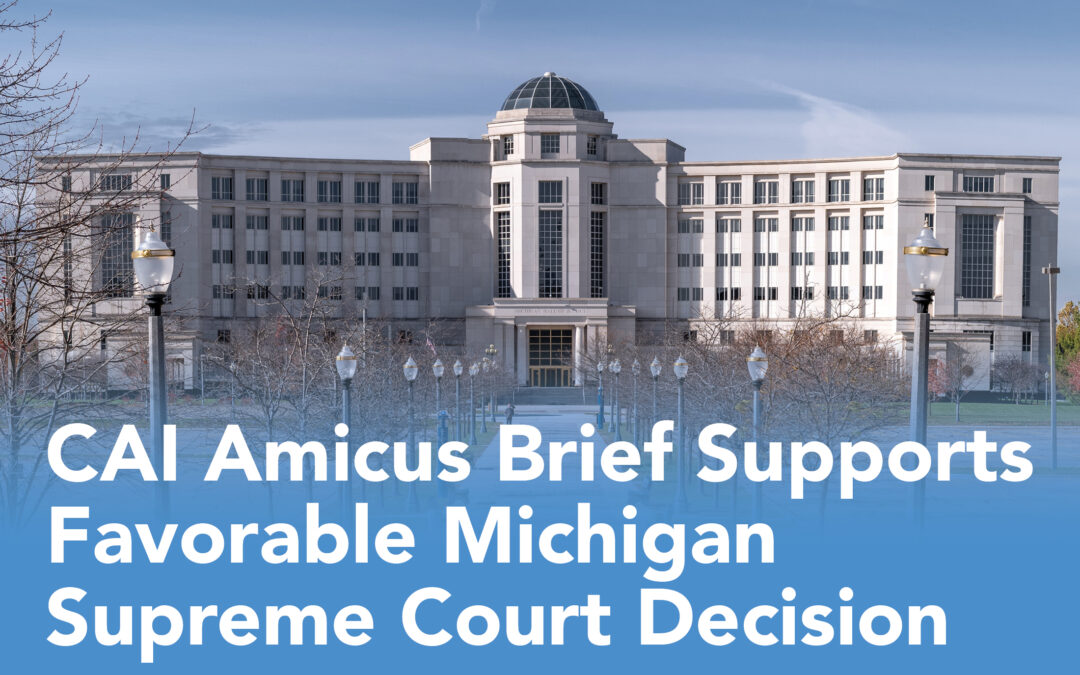The Supreme Court of Michigan denied an insurance and surety brokerage firm’s application for leave to appeal the judgment of the Michigan Court of Appeals in favor of a Michigan condominium association due to lack of persuasion that the questions presented by the firm should be reviewed by the Supreme Court.
In December 2022 CAI’s Amicus Curiae Committee approved a friend-of-the-court brief in Elizabeth Trace Condominium Association vs. American Global Enterprises. Kayleigh Long and Kevin Hirzel, fellow in CAI’s College of Community Association Lawyers, each attorneys of Hirzel Law in Farmington, Mich., authored the brief, successfully urging the Supreme Court to deny leave to appeal.
“The trial court’s and Michigan Court of Appeals’ decisions in this case, and the Michigan Supreme Court’s decision not to consider the case, is an important reaffirmation of the line of cases interpreting section 559.167(3) of the Michigan Condominium Act. The section governs the development of a condominium project, including amendment; revisions to the condominium subdivision plan; the right to withdraw land; reversion of undeveloped land to general common elements; and election, notice, and recording requirements, among other provisions,” says Long.
In 2019, the Michigan Court of Appeals held that all developer rights to construct “need not be built” condominium units automatically cease, and the land becomes general common elements if those units are not constructed within the maximum statutory time periods. In this case, the statutory time periods expired prior to Sept. 21, 2016.
“The Michigan Court of Appeals’ interpretation and application of the Michigan Condominium Act, as amended in 2002, ensures that unfinished condominium projects do not exist in perpetuity. The decision allows condominium associations to control the undeveloped portions of their communities and confidently plan for their future” says Long.
The Supreme Court’s denial of this appeal affirms various Michigan Court of Appeals opinions and the condominium association’s argument that unbuilt condominium units become general common elements by operation of law under section 559.167 because the unbuilt condominium units were not developed, constructed, or withdrawn from the condominium by the end of the statutory period. The ruling reaffirms the community association industry’s interpretation of this section of the Michigan Condominium Act.
The Michigan Supreme Court’s refusal to hear the appeal in the Elizabeth Trace case provides certainty for Michigan condominium associations in structuring their operations and determining whether “need not be built” condominium units still exist in certain communities, according to Hirzel. “If the opinion of the Court of Appeals were overruled, and condominium units that were previously eliminated under 559.167 magically reappeared, it may have disrupted standard operations for many condominium associations that were impacted by the prior version of the statute. The decision further confirms prior appellate precedent that held that 559.167 is constitutional and that the 2016 amendment was not retroactive. As a result of the Supreme Court’s ruling, condominium associations can continue to budget appropriately, plan elections, and ensure that their projects are eligible for mortgage financing,” says Hirzel.
More than 1.4 million Michiganders live in 578,000 homes in nearly 8,550 community associations, according to the 2022 National and State Statistical Review for Community Association Data, published by the Foundation for Community Association Research. Roughly 89% of these residents say their association’s rules protect and enhance property values.
Amicus curiae briefs allow CAI to educate a court about important legal and policy issues in cases related to the community association industry. If your association, municipality, or state needs assistance in contesting an adverse judicial opinion, please contact CAI and submit a request for an amicus brief. If you have any questions, contact Phoebe E. Neseth, Esq., at pneseth@caionline.org




Great result – thanks to those who put in the effort.
I live in a 50 unit patio home complex. 29 units are built on a concrete slab, and 21 units have basements, hence more square footage. We pay our fees according to sq ft, and the court is saying no other way is possible even if it says so in our documents. The difference in cost on the average is $220.32 per month or $2643.84 per year. 29 pay $320.33 and 21 pay $540.65. We vote by the unit not by the square foot, but we can vote by the square foot in matters of how fees are calculated. We did and changed fee formula and the Judge said it was not legal.